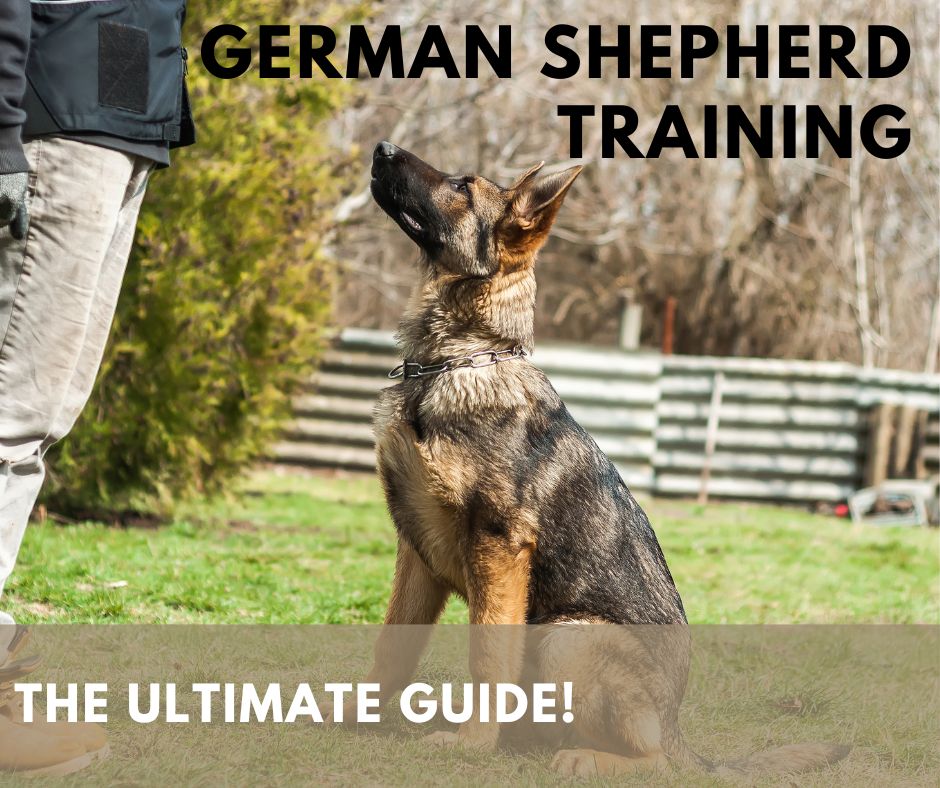Welcome, fans of German Shepherds and dog lovers! I’m excited to have you with me on this incredible journey into German Shepherd training.
Having a well-behaved, loyal companion by your side is great, right? Well, I feel the same way, and I want to help you learn how to make your furry friend even better.
Before we dive into the nitty-gritty of training techniques, let me introduce myself. I’m Jo, and I’ve been living the German Shepherd dream for over twenty years!
These dogs have been a part of my life for as long as I can remember, and they’ve taught me some valuable life lessons.
Exploring the Extraordinary German Shepherd Traits
From my experience, I’ve learned what makes German Shepherds special. They’re super intelligent, loyal, and always full of energy.
This guide is like my special project. It’s a collection of things I’ve learned, tips from experts, and ways to train that really work.
Whether you are welcoming a new German Shepherd or you’ve had one for a while, I hope you find something useful here to make the bond with your dog even better.
Table of Contents:
- The Training Journey Unfolds: From Basics to Fancy Moves
- Unravelling the German Shepherd: Origins, Traits, and Training Impact
- Fostering Leadership and Trust: The Cornerstones of Effective Training
- Pawsitive Training Techniques: Unleashing the Full Potential of Your German Shepherd
- Navigating Potty Training, Leash Training, and Crate Training: A Roadmap to Success
- Mastering the Basics: Essential Obedience Training for German Shepherds
- Socialisation Secrets: Creating a Well-Behaved German Shepherd
- Taking It to the Next Level: Advanced Training Techniques for German Shepherds
- Conquering Common Behaviour Problems: A Training Odyssey
- Gear Up for Success: Essential Training Tools and Equipment for German Shepherds
- Tailoring Training for Every Stage: From Playful Pups to Wise Adults
- The Personal Touch: Unraveling the Importance of Understanding Your German Shepherd’s Motivation
- The Journey Continues: Maintaining Training and Expanding Horizons
- Seeking Professional Support: Consulting Trainers and Behaviourists
- The Importance of a Training Routine: Building the Foundation for Success
- Frequently Asked Questions: Unleashing the Secrets of German Shepherd Training
- Conclusion: Our Journey to Creating Well-Behaved German Shepherd Companions
The Training Journey Unfolds: From Basics to Fancy Moves
Let’s jump into this adventure together. First, we’ll find out where German Shepherds come from and how that affects how we teach them.
Next, we’ll tackle the most important part of training—showing them you are the leader and building a strong trust bond.
Knowing the essential rules is essential. I’ll show you the basic commands and fun ways to help your German Shepherd learn.
We’ll also discuss common problems like barking too much and separation anxiety. I’ll give you solutions to help with these issues and make your home a peaceful place.
But wait, there’s more! We’ll make your training even better by learning some more advanced methods. We’ll use your German Shepherd’s natural talents, like being agile and good at finding scents.
We will also explore the importance of socialisation and creating a well-behaved companion who is a joy to be around in any situation.
Unleashing Your German Shepherd’s Full Potential
Stick with me as we get the right tools and plans for every stage of your German Shepherd’s life. We’ll create routines for success.
And guess what? We’ll even learn about special training for things like competitions and being a therapy dog, so your dog can be amazing in many ways.
Get ready, pet owners! This guide is packed with cool stuff and excellent tips to make your German Shepherd the best. You’ll build a strong bond, create good habits, and make memories that’ll stick around. Let’s start this journey step by step!
Unravelling the German Shepherd: Origins, Traits, and Training Impact

History and Characteristics: Influences on Training
To understand our German Shepherds, it’s essential to look into their past. These dogs have a fascinating history and some unique characteristics that make them who they are today.
They were first bred in Germany during the late 1800s to assist in herding and protecting livestock. But they were so intelligent and good at many things that people all around the world noticed. As well as herding, they started doing jobs like police and military work and even helping in therapy.
For more in-depth information about the history and characteristics of German Shepherds, you can visit the official website of the German Shepherd Dog Club of America (GSDCA)
German Shepherds are working dogs, and this working background influences their training. They like having jobs to do and things to achieve. Knowing their history helps us choose the correct training methods that match their natural skills.
This makes learning fun and rewarding for both us and our furry friends.
Decoding Temperament: Key Traits Shaping German Shepherd Training
German Shepherds are super loyal, intelligent, and good at keeping us safe.
But, these traits can also present unique challenges during training. Understanding their temperament is key to navigating the training journey.
Their intelligence makes them quick learners, but it also means they can become bored. Fun activities and varied training exercises can keep them interested and paying attention.
Their loyalty means they care about their family and may feel worried when we are not around. If we don’t address this during training, it could lead to separation anxiety.
Because they want to protect, they might be cautious around people they don’t know. But if we help them meet lots of different people, they can become well-behaved and confident in different situations.
When we train them, it’s key to balance their natural abilities with any challenges that might come from their personality.
Safety First: Preparing for Training Success with a Healthy German Shepherd
Before we embark on the training journey, ensuring our German Shepherds are in optimal health is paramount.
Going to the vet often will give us peace of mind and help us find any underlying health issues that might impact their training progress.
You must also provide them with a healthy diet and regular exercise. Proper nutrition keeps their bodies and minds sharp, enabling them to engage in training sessions.
Regular exercise helps them use extra energy, so they can pay better attention and learn more during training.
By understanding where German Shepherds come from, we can determine how they act and make sure they’re healthy.
Fostering Leadership and Trust: The Cornerstones of Effective Training
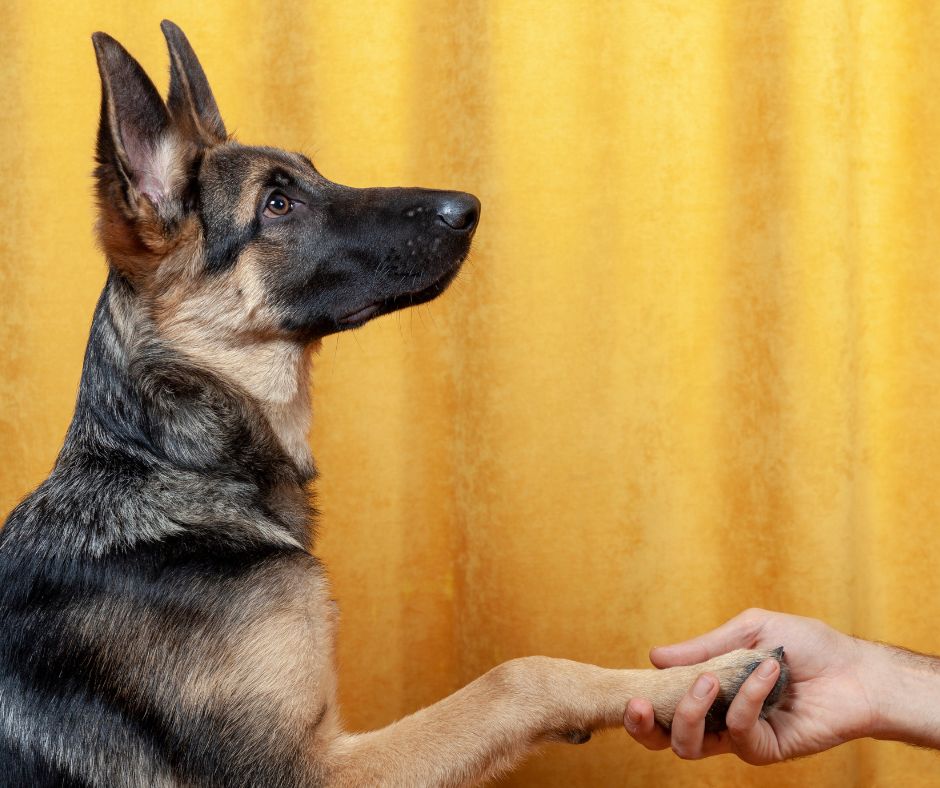
Becoming the Alpha: Gaining Respect and Obedience in German Shepherds
As proud owners of German Shepherds, we must establish ourselves as reliable leaders in their eyes. A clear hierarchy is crucial for a well-functioning family unit in their pack-oriented mindset.
By assuming the role of the alpha, we gain their respect and create a solid foundation for training.
Becoming the alpha means resorting to something other than harsh or domineering methods. Instead, we build leadership through consistency, fairness, and positive reinforcement.
Setting clear limits and ensuring they follow the rules will help them know where they fit in the family and feel safe.
It’s also important to avoid physical punishment, as it can erode trust and cause fear in our loyal companions. Use positive reinforcement methods like offering praise, treats, and affection.
This works well and will teach them good behaviours while strengthening our friendship.
Building Unbreakable Bonds: Trust as the Foundation of Successful Training
Trust is the base of a meaningful friendship. The strong connection we build with our German Shepherds is also vital for their training to work well. Building trust takes time, patience, and understanding.
During training sessions, we must maintain a calm and reassuring demeanour, showing them they can rely on us.
We avoid raising our voices or reacting with frustration, as this could undermine their trust in us. Instead, we remain patient and supportive, celebrating every small achievement along the way.
Creating a strong bond is not only limited to training sessions. When we hang out, have fun, and do things together, like playing and going on trips, it makes our bond with our German Shepherds even stronger.
Understanding Canine Body Language: Communicating with Your German Shepherd
As we embark on this training journey, being fluent in canine body language becomes an invaluable skill. Like all dogs, German Shepherds show how they feel and what they need with their bodies and faces.
Knowing these signs helps us react in the right way and create a suitable training atmosphere.
A wagging tail may mean excitement or happiness, while a tucked tail could signify fear or discomfort. Dilated pupils might mean stress, while relaxed ears and a loose body posture show contentment.
Observing their body language allows us to gauge their feelings and adjust how we teach them.
Making sure we’re leaders they can trust helps our training go well. When we use rewards to teach and understand their feelings, we build a great friendships with our dogs.
These essential ideas will help us use the correct training methods as we go on. This will make our German Shepherds the excellent and joyful friends we’ve hoped for.
Pawsitive Training Techniques: Unleashing the Full Potential of Your German Shepherd
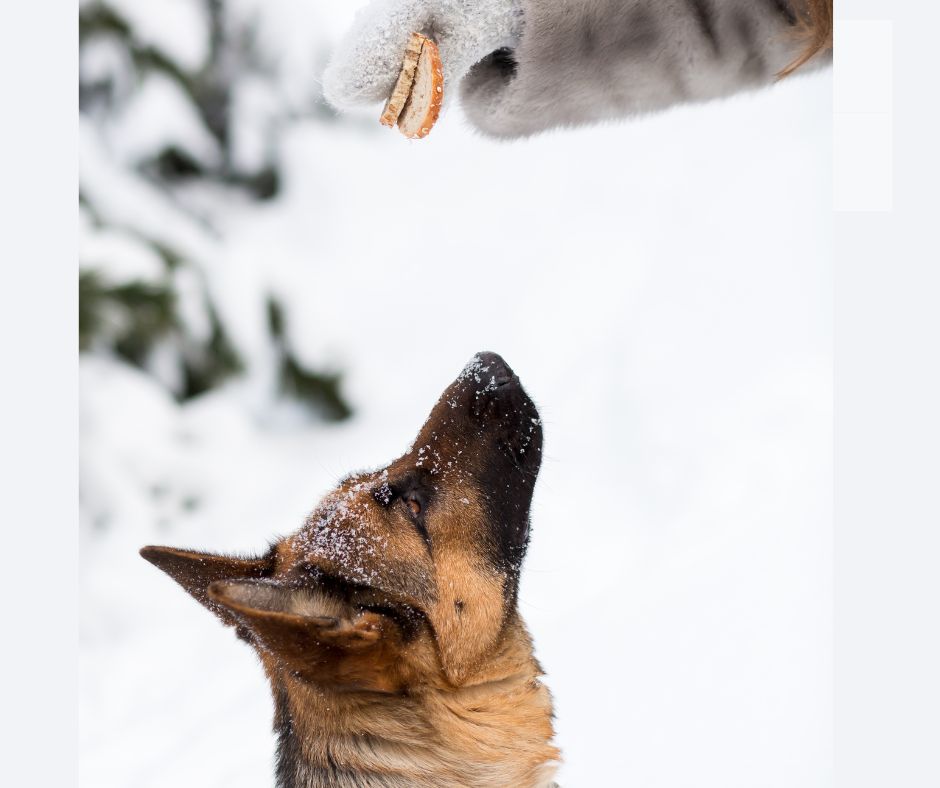
Positive reinforcement techniques form the cornerstone of practical training for German Shepherds. Rewards, like treats, praise, and play, encourage them to repeat desired behaviours.
This approach enhances their learning and fosters a joyful and eager attitude during training.
It’s also important to reward them immediately when they do what we want. This helps them connect the command with the reward. Timing is crucial to prevent confusion and make the learning process smoother.
Consistency is another crucial aspect of positive reinforcement training. When we always give rewards for good actions and don’t reward bad ones, they learn what’s right and what’s not.
Learning the basic rules makes our German Shepherds act well and become good all-around dogs. Teaching essential commands like sit, stay, come, and down while using rewards makes our bond strong and learning fun.
As we practice these important skills, we’re preparing for tougher training and a life full of enjoyment with our smart and loyal friends.
Navigating Potty Training, Leash Training, and Crate Training: A Roadmap to Success
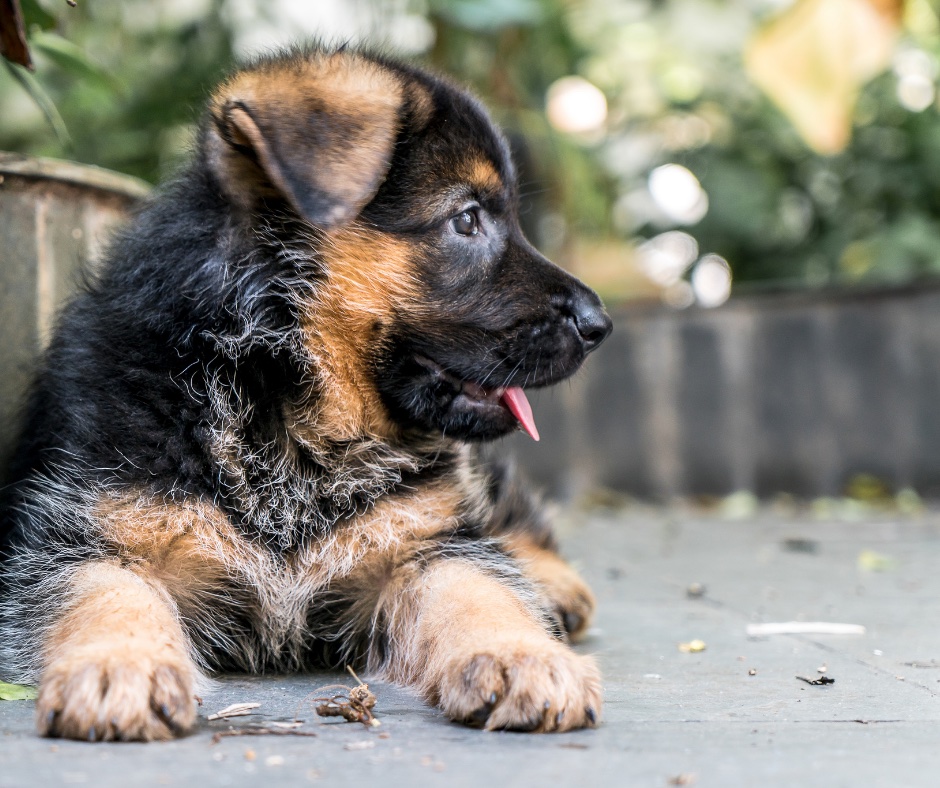
Potty Training: A Fundamental Step Towards a Well-Mannered Companion
Potty training is one of the first and most crucial aspects of German Shepherd training. The aim is to teach your pup to relieve themselves in appropriate areas and avoid accidents inside the house.
If you’re patient, do things the same way every time, and use rewards, you can help your German Shepherd succeed.
Establish a Routine
Establishing a consistent potty break schedule is teaching your puppy to understand when it’s time to go outside. Ideal times are after meals, playtime, and waking up from naps.
Designated Potty Area
Pick a specific spot in your yard for potty breaks. Taking them to the same place every time helps them associate that area with the act of relieving themselves.
Watch for Signs
Observe your puppy for signs of needing to go, such as circling or sniffing around. If you notice these behaviours, lead them to the designated potty area.
Use Positive Reinforcement
Offer your puppy praise and rewards, such as treats and affection, when they relieve themselves in the designated area. Positive reinforcement strengthens the connection between the behaviour and the reward.
Be Patient with Accidents
Accidents will happen during the learning process. Avoid scolding or punishing your puppy as this can create fear and hinder the training progress. Instead, clean up any accidents in a calm manner and continue with the training routine.
Get comprehensive guidance on potty training from experts at PetMD, ensuring a smooth and well-mannered transition for your German Shepherd.
Leash Training: A Key to Safe and Enjoyable Walks
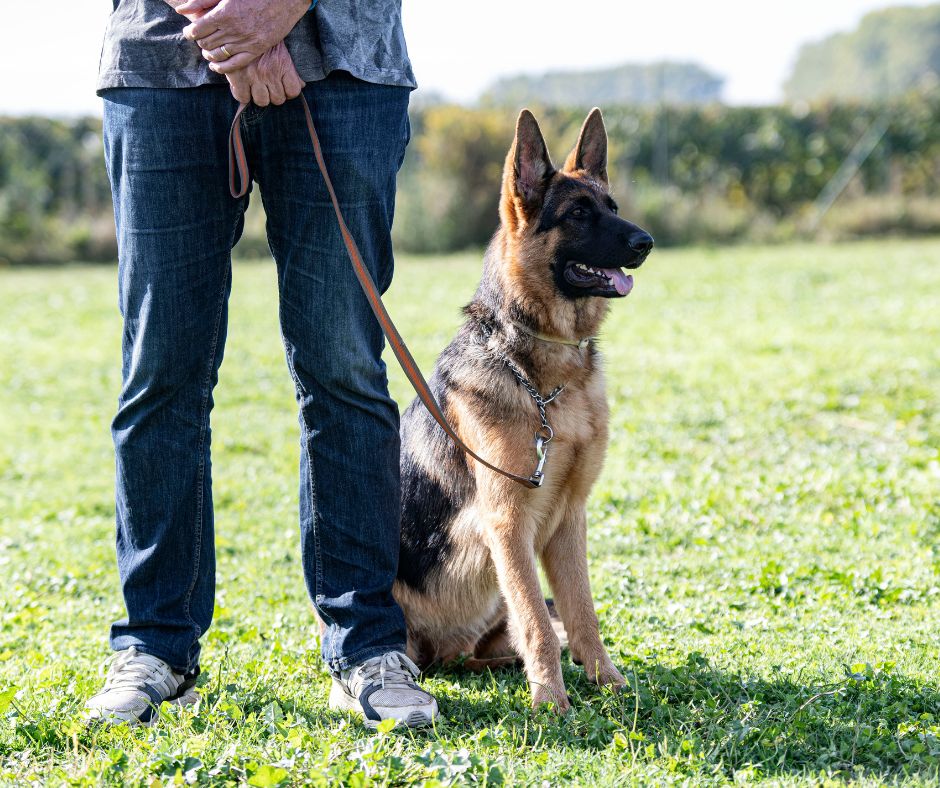
Leash training is essential to ensure safe and pleasant walks with your German Shepherd. It also helps them learn to walk beside you without pulling and stay responsive to your cues.
Start Early
Begin leash training as early as possible, even during puppyhood. Start indoors or in a quiet outdoor area to minimise distractions.
Choose the Right Leash and Collar/Harness
Select a comfortable, sturdy leash and appropriate collar or harness for your German Shepherd. Flat collars work well for most dogs, but harnesses can be beneficial for strong pullers or those with neck issues.
Positive Reinforcement
Use treats, praise, and encouragement to reward your German Shepherd for walking in a calm manner beside you. Avoid harsh corrections or yanking on the leash, as this can cause discomfort and a negative association with it.
Focus on Loose Leash Walking
Encourage your dog to walk with a leash that is loose. When they pull, stop walking and wait until they release tension on the leash. Resume walking when they walk beside you without pulling.
Practice Patience
Leash training takes time and consistency. Be patient and understanding as your dog learns to walk politely on a leash. Gradually increase the distance and exposure to distractions as they improve.
Crate Training: A Safe Haven and Effective Training Tool
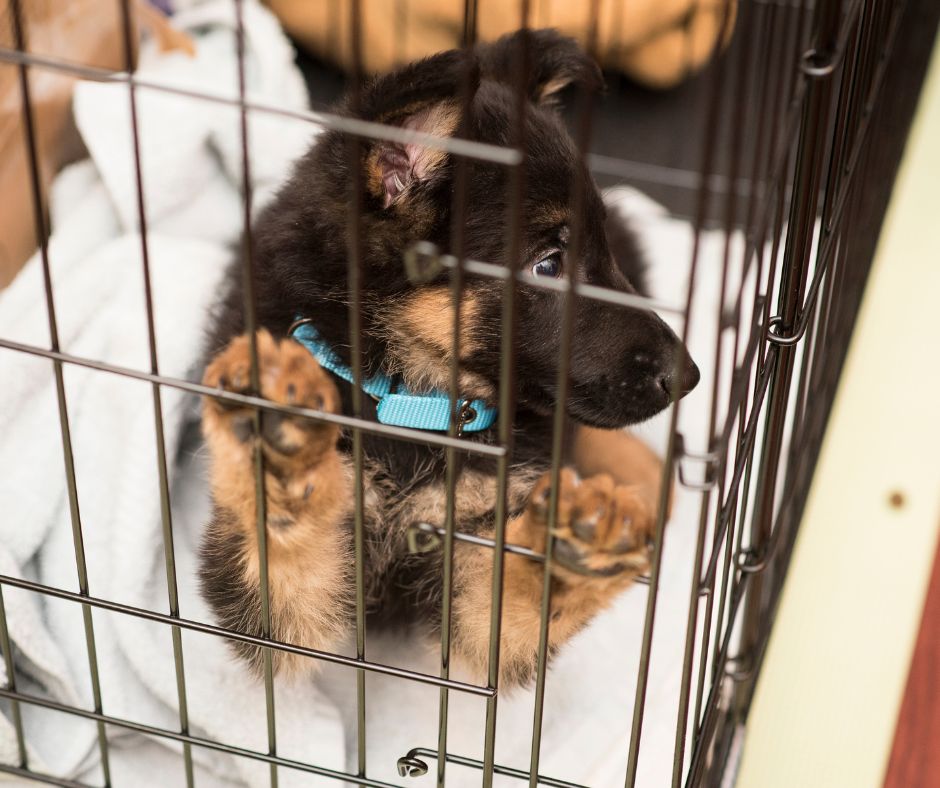
Crate training is another essential aspect of German Shepherd training. A crate is like a safe and comfy spot for your puppy when you’re not around. It helps with potty training and stops them from doing things they shouldn’t.
| Choose the Right Crate: | Add soft bedding and toys to make your puppy’s crate inviting and comfortable. You aim to create positive associations with the crate for them. |
| Make it Cosy: | Add soft bedding and toys to make your puppy’s crate inviting and comfortable. You aim to create positive associations with the crate for them. |
| Gradual Introduction: | Introduce the crate slowly, allowing your puppy to explore it at their own pace. Encourage them to enter the crate with treats and praise. |
| Positive Associations: | Use treats and praise when your puppy enters the crate willingly. Refrain from using the crate as punishment. |
| Time Alone in the Crate: | Start with short periods of crate time and gradually increase the duration. This helps your puppy get accustomed to being alone and prevents separation anxiety. |
Remember, potty, leash, and crate training need time and patience. Celebrate every small success and be understanding during the learning process.
If you keep teaching them and using rewards, your German Shepherd will become a polite and happy friend. They will show excitement about going on a walk or doing something fun with you.
Mastering the Basics: Essential Obedience Training for German Shepherds
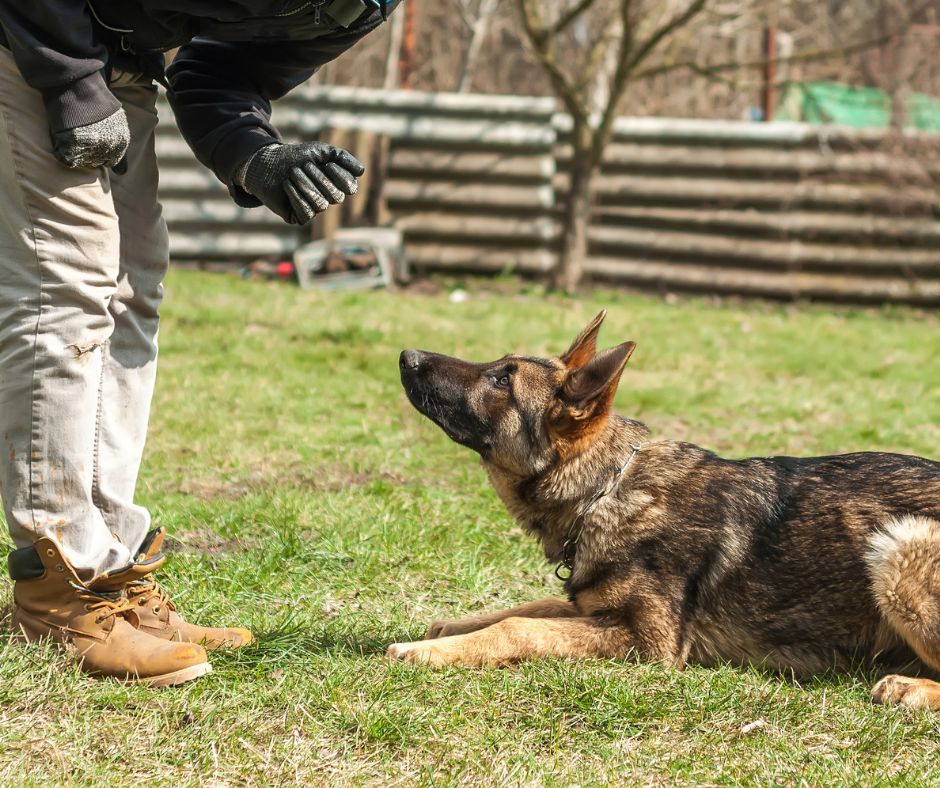
Sit, Stay, Come, Down: Teaching Crucial Commands with Positive Reinforcement
The foundation of a well-behaved German Shepherd lies in mastering essential obedience commands. These fundamental cues ensure their safety and make daily interactions more enjoyable. Using rewards to teach them, we can help them learn these commands well while deepening our bond.
| Sit: | Introducing the “sit” command is among the initial steps we take in training our German Shepherds. We gently guide them into a sitting position with a treat held above their head. We reward them with a treat and plenty of praise upon successful completion. Consistent practice helps them understand this command, and soon they’ll sit like champions. |
| Stay: | Teaching our German Shepherds to “stay” is crucial for their safety and our peace of mind. Starting with a “sit” or “down” command, we use a firm hand signal and the verbal cue “stay.” As we take a step back, we reward them if they remain in position. Gradually increasing the distance and time helps them get a good understanding of the “stay” command. |
| Come: | The “come” command is essential. It’s for calling our German Shepherds to come to us, especially if there’s danger or they’re not on a leash. We use their name followed by the “come” cue while encouraging them enthusiastically. When they come to us, they receive a treat and affectionate praise, reinforcing positive associations. |
| Down: | Teaching them to “down” involves gently guiding them into a lying position and rewarding them with treats and praise. This command helps us manage their excitement and energy in different situations. |
Socialisation Secrets: Creating a Well-Behaved German Shepherd
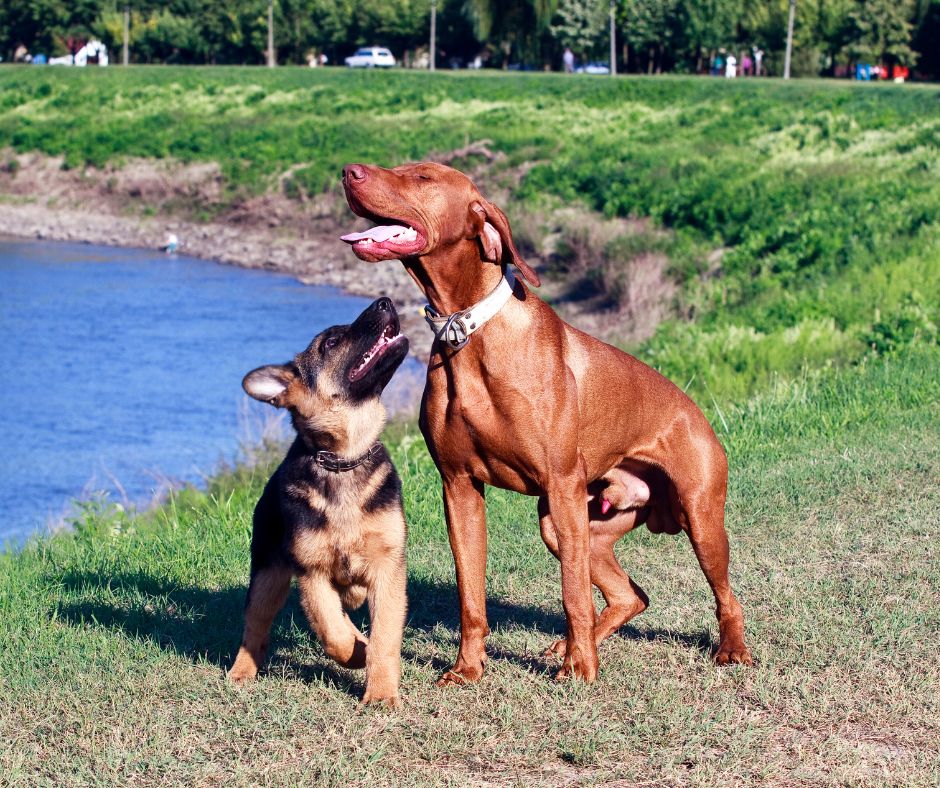
Unleashing Social Butterflies: The Importance of Socialising Your German Shepherd
Ensuring they experience many different things is vital for German Shepherd training.
When they’re young, between 3 to 16 weeks old, they learn a lot and are open to new things. Showing them new stuff like sounds and places helps them get used to the world.
You should do this step by step and in a kind manner, ensuring they have positive experiences. Letting them meet other dogs, friendly people, and new places helps them feel safe and trust the world.
Nipping Behaviour Issues in the Bud: Tackling Common Challenges Head-On
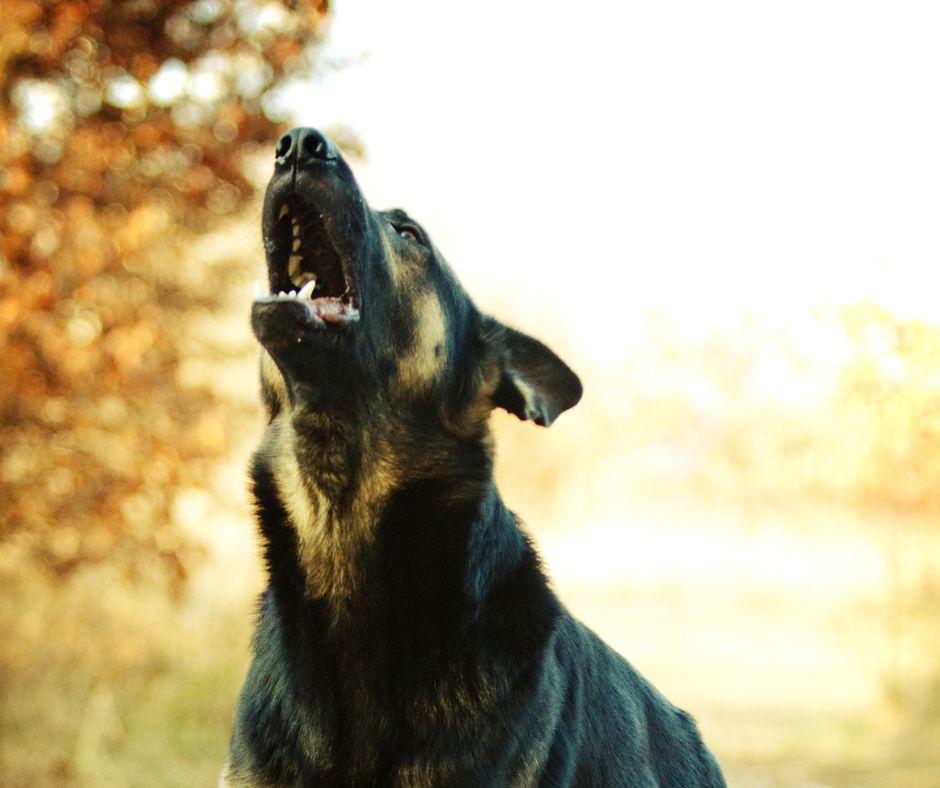
German Shepherds are clever and caring, but they might show behaviours needing special care and training.
| Jumping: | To address jumping, we teach them an alternative behaviour, such as sitting when greeting people. When we reward them for sitting instead of jumping, we help them pay attention to the right things and act in a good way. |
| Leash Pulling: | You can manage leash pulling by using positive reinforcement. When they walk without pulling, we reward them with treats and praise. If they start pulling, we stop and wait until they return to our side before continuing. |
| Excessive Barking: | German Shepherds might bark too much. To make them stop, we figure out why and help them focus on good things. When they’re calm and quiet, we give them rewards. |
| Chewing: | Giving them toys to chew on and showing them what’s ok to chew stops them from ruining things like furniture or shoes. |
By dealing with these issues early on, using rewards and being consistent, we make our German Shepherds polite and fun to be around.
Keeping Them Busy: Fun Activities for a Happy German Shepherd
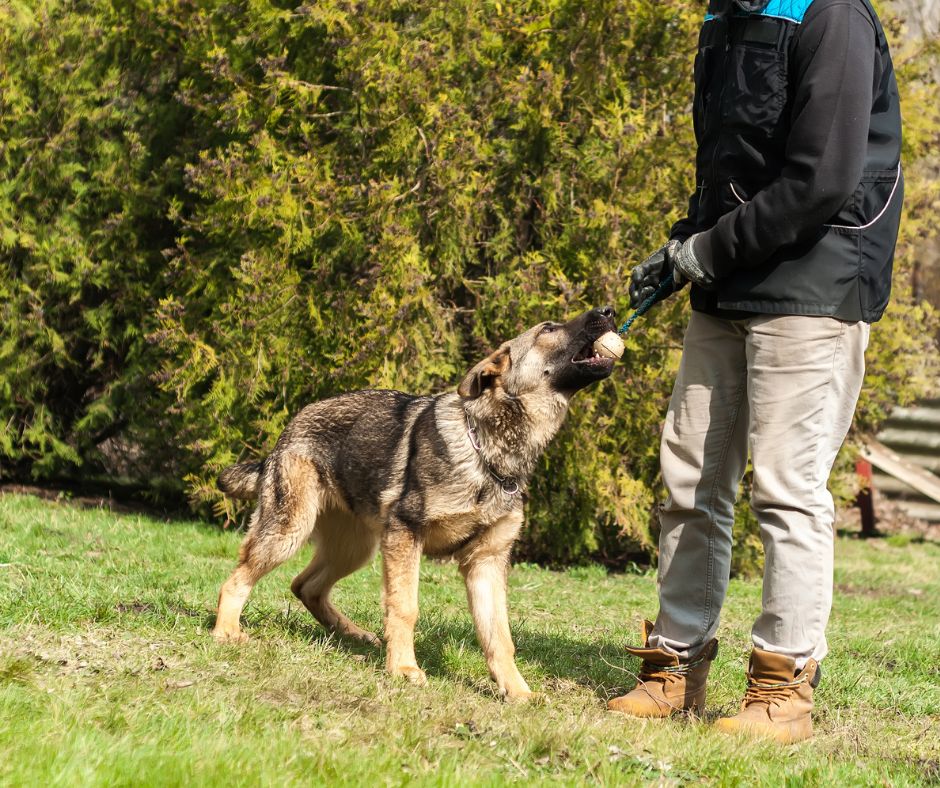
German Shepherds need things to think about and do. Doing activities that challenge their minds and bodies every day keeps them busy and healthy.
| Puzzle Toys: | Puzzle toys challenge their problem-solving skills and prevent boredom. |
| Nose Work: | Engaging their sense of smell with scent games taps into their natural instincts. |
| Training Games: | Mixing fun training exercises with play strengthens their bond with us. |
| Fetch and Tug-of-War: | Physical activities like fetch and tug-of-war allow them to burn off energy. |
Helping our German Shepherds experience many different things makes them confident and happy.
Solving common behaviour problems with training and giving them fun things to do makes our relationship great.
They become amazing dogs when we know what they need and teach them with care. They’ll be loyal, polite, and well-rounded furry friends for all our adventures.
Taking It to the Next Level: Advanced Training Techniques for German Shepherds
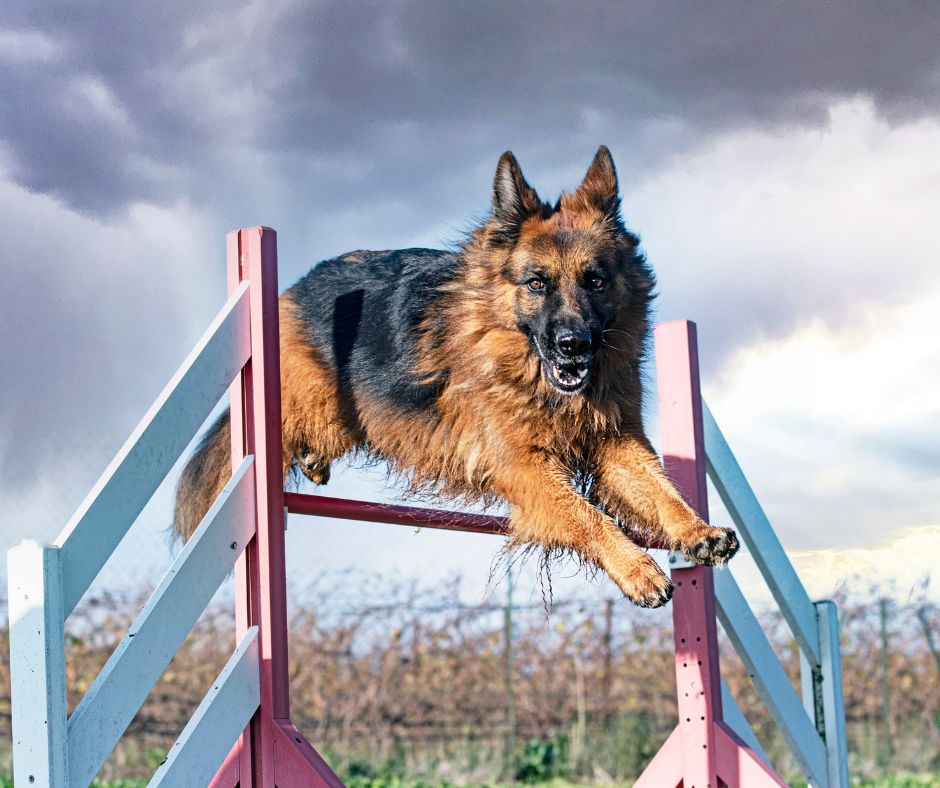
Agility Unleashed: Enhancing Your German Shepherd’s Skills and Versatility
German Shepherds are good at moving and jumping, so they’re great for agility training. This fun and active game keeps them strong and strengthens our bond with them as we do it together.
Agility training is like a timed obstacle course with jumps, tunnels, and other things. We use rewards and take our time to guide them through it. When they do well, we celebrate.
Agility lets them use their natural skills and feel confident. It’s an excellent way to use their energy in a fun and challenging way. Plus, we often make friends with other dog lovers!
Using Their Nose: Discovering Scents with Your German Shepherd
German Shepherds are great at finding scents because they have a fantastic sense of smell. They can learn to find missing people or hidden stuff by training.
We start by showing them a smell and rewarding them when they find it. As they improve, we make it harder and do more complicated searches.
Scent training lets them use their talents and keeps their minds sharp. They like solving problems. It’s fantastic for both them and us and shows how smart and committed they are.
Adapting Skills Everywhere: Learning in Different Places
Besides basic commands, practising those commands in new places is essential. Taking them to new spots helps them focus even when there are distractions.
We start with easy places and move to harder ones, like parks or busy streets. With rewards, we teach them to listen to us even when other people, animals, or things are around us.
Training in different places helps them follow commands anywhere. It makes them more sure of themselves and lets us trust them in any situation.
These advanced training ideas let our German Shepherds show their many talents. Agility makes them athletic and good at teamwork, while scent detection uses their strong sense of smell.
Practising in different places makes them adaptable and trustworthy buddies.
These advanced training ideas fulfil their working dog instincts. It also strengthens the bond we share with these extraordinary and devoted dogs.
Conquering Common Behaviour Problems: A Training Odyssey

Barking Solutions: Training Your German Shepherd to Control Excessive Vocalisation
German Shepherds have a protective nature, and one of the ways they express themselves is through barking.
Barking is a way dogs talk, but barking too much can bother people and cause problems with neighbours or guests. Which is something we, as dog owners, don’t want either.
To address excessive barking, we need to understand the triggers behind it. When they bark too much, it could be because they’re bored, scared, protecting their space, or just want attention. Figuring out why is the first step to making it stop.
Positive reinforcement is, again, a powerful tool. When our German Shepherds remain calm and refrain from barking in response to the trigger, we reward them with praise and treats.
Getting them to think about something else and showing them different actions, like sitting or lying down, can make them stop barking so much.
Consistency is key in tackling excessive barking. With patience and persistence, we can teach them when it’s appropriate to bark and when it’s time to be quiet.
As time goes on, they’ll learn to manage their barking, making the environment calmer for everyone.
Separation Anxiety: Helping Your German Shepherd Through Absences
Our German Shepherds form strong bonds with us, and when we leave them alone, they may experience separation anxiety. Signs of separation anxiety include excessive whining, destructive behaviour, and restlessness.
To help them cope with absences, we can start by desensitising them to our departures. This means gradually making the time we’re not with them longer. We begin with short times and make them longer slowly.
Giving them toys that keep them busy or toys where they have to figure things out can help them think and take their mind off us not being there. Additionally, playing calming music or leaving an item with our scent can offer comfort during our time apart.
Rewarding them when we return and not making a big fuss when leaving helps normalise our comings and goings. By practising these techniques, we can build their confidence and reduce separation anxiety over time.
Addressing common behaviour problems is a vital aspect of German Shepherd training. If we know why they bark too much and use rewards, we can stop them from making too much noise and make our home peaceful.
When they feel worried when we’re not around, we can help them get used to it slowly and give them things to do. With patience and teaching them the same thing often, we make a good and balanced friendship with them.
Gear Up for Success: Essential Training Tools and Equipment for German Shepherds
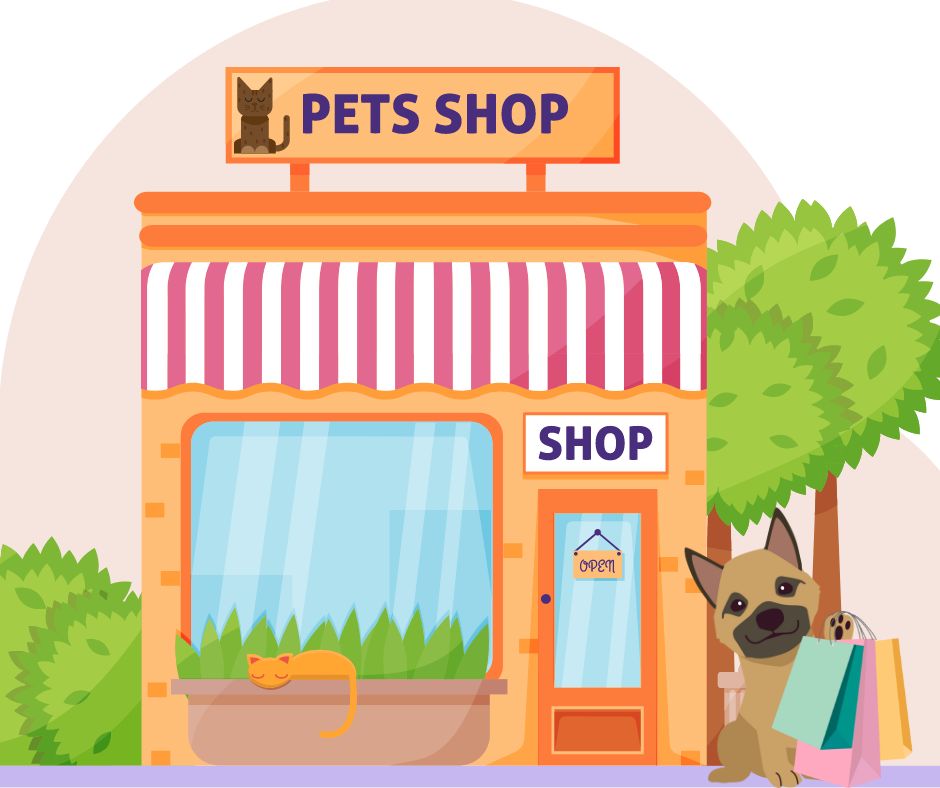
Collars and Leashes: The Perfect Fit for Effective Training Sessions
Selecting the right collar and leash for your German Shepherd is crucial for successful training sessions. A collar that fits well keeps them safe, and a suitable leash facilitates communication.
| Flat Collar: | A traditional flat collar is a standard option for everyday use. It should fit comfortably around your German Shepherd’s neck without being too tight or loose. Attach identification tags to the collar for added safety. |
| Martingale Collar: | Martingale collars are ideal for dogs with narrower heads, like German Shepherds. They tighten slightly when the dog pulls, preventing escape while remaining gentle on the neck. |
| Harness: | Harnesses distribute pressure more evenly across the chest and back, making them a good choice for strong pullers. They also minimise strain on the neck, especially during leash training. |
| Training Collar: | Use a training collar, such as a slip or prong collar, with caution and only with guidance from a professional trainer. These collars have specific training purposes, and you should never leave your dog unsupervised while using them. |
Clickers and Treat Pouches: Power Tools for Positive Reinforcement Training
Clicker training is a powerful method that reinforces desired behaviours with the sound of a click, followed by a treat. The click serves as a marker to signal the exact moment your German Shepherd performs the desired action.
| Clicker: | Clickers are inexpensive and readily available. They create a consistent and distinct sound, allowing for precise communication during training. Pairing the click with a treat reinforces positive associations with the training process. |
| Treat Pouch: | A treat pouch is convenient for keeping treats at hand during training sessions. It makes it quick and easy to get rewards, so we can give them right away when they do something good. |
Family Consistency: Ensuring Harmony in Training Approaches
Using the same training ways is essential, especially if many people live in your house. Your German Shepherd needs clear and consistent signs from everyone to understand and do what you say.
When everyone agrees on what words and rules to use, it helps your German Shepherd know what to do and stops them from getting mixed up.
Regular practice together as a family strengthens these rules and improves friendship with your dog.
Picking the right tools and things for training helps a lot. The right collar and leash help with control and safety, and clickers and treat bags make rewards work better.
When the whole family uses the same training, it makes everything smoother and happier. Your German Shepherd will do well and become the well-behaved companion you’ve always dreamed of.
Tailoring Training for Every Stage: From Playful Pups to Wise Adults
Raising Pint-sized Paws: Puppy Training Tips for a Strong Foundation
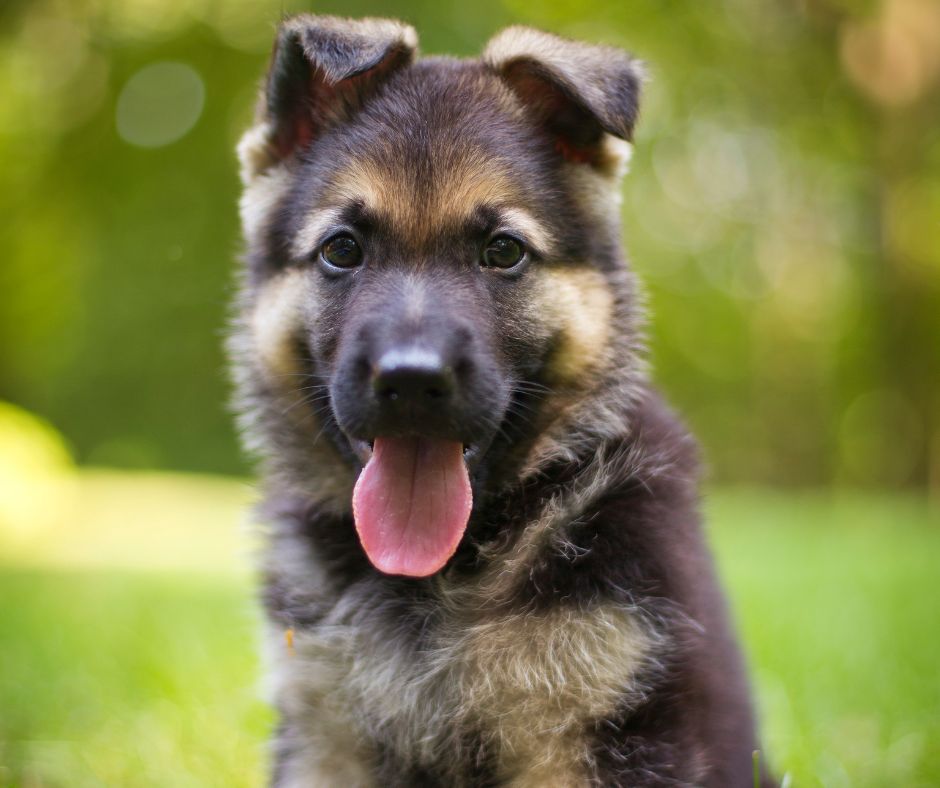
Training a German Shepherd puppy is an exciting and rewarding journey. Early training sets the stage for a lifetime of good behaviour and a well-mannered companion.
Begin by teaching fundamental commands such as sit, stay, and come. Be calm and keep doing it, using rewards to encourage desirable behaviours.
When they’re puppies, it’s essential to let them meet different people, animals, and places. This helps them feel sure and able to handle new things.
Start crate training to offer your puppy a secure and cosy space when you are absent. This not only aids in potty training but also helps prevent destructive behaviours.
Thriving Through Adolescence: Tailoring Training Techniques for Growing German Shepherds
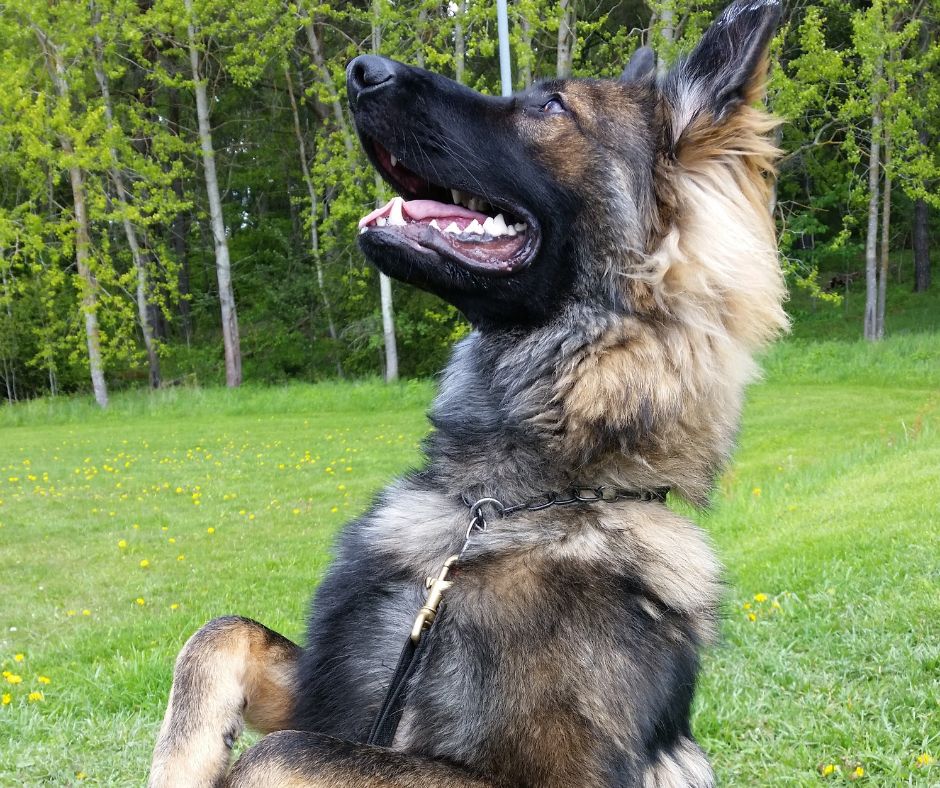
As German Shepherds reach adolescence, they may become more independent and test boundaries. It’s essential to remain firm and consistent in your training during this phase.
Keep reminding them of basic commands, and start showing them more challenging things to do. This keeps their intelligent minds busy.
Exercise is crucial for adolescent German Shepherds. Involve them in physical activities to channel their energy positively and productively.
Stay patient and get ready for some ups and downs during adolescence. Consistency and positive reinforcement will help you navigate through this challenging phase.
Lifelong Learning: Training Tips for Adult German Shepherds to Stay Sharp
Training doesn’t stop when your German Shepherd reaches adulthood. Continuing education and reinforcement are vital for a well-behaved and mentally stimulated dog.
Introduce new training exercises and tricks to keep their minds sharp and engaged. This helps prevent boredom and strengthens your bond.
Consider participating in advanced training classes or activities. Things like obedience competitions or agility trials are good choices. These challenges provide opportunities for growth and achievement.
Keep practising the simple commands often to ensure they still listen and do what you say, no matter where you are.
Training German Shepherds at different life stages requires specific approaches. For puppies, focus on establishing good habits and socialisation. With adolescent dogs, handle challenges with consistency and patience.
For adult dogs continue their education through advanced training and ongoing reinforcement. With the right methods and commitment, you can have a happy and well-trained German Shepherd companion for life.
The Personal Touch: Unraveling the Importance of Understanding Your German Shepherd’s Motivation
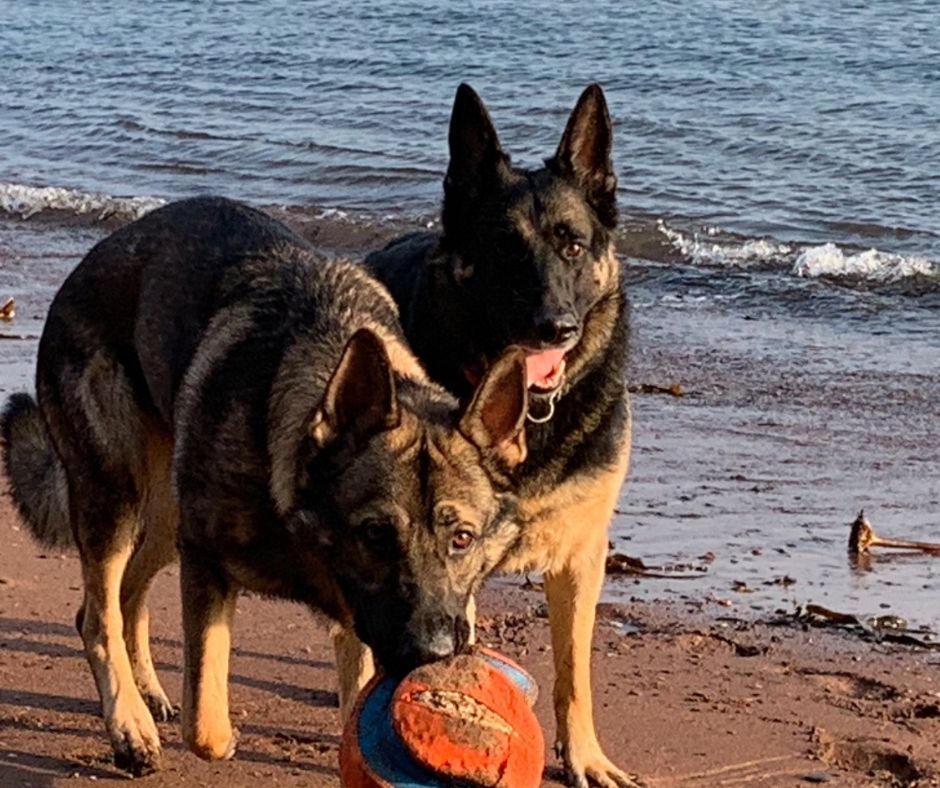
As we go through this ultimate guide about training German Shepherds, I want to tell you something from my life that might help.
It’s a story a lot of you will understand, especially if you’ve had some troubles while training your furry friends.
You probably know by now that I have two beloved German Shepherds, Bella and Cody, who have filled my life with joy and endless adventures. That’s them in the picture above enjoying a trip to the beach. Cody is the one with the ball in his mouth.
We got them as cute puppies, one year apart, and I didn’t know they would teach me so much about their unique personalities and reasons for doing things.
Bella’s Training Challenges: A Stubborn but Intelligent Companion
Bella, oh Bella, she was a challenge like no other. Despite her undeniable intelligence, she had a mind of her own, and getting her to follow commands sometimes seemed impossible. I remember thinking, “Aren’t German Shepherds supposed to find this stuff easy, so what’s going on here?”
Frustration got the best of me, and I decided to seek the guidance of a professional trainer who could help us crack the code to Bella’s training quirks.
After many months of trying, the trainer told us something surprising – Bella was smart and knew everything we taught her. She just decided to be a bit stubborn sometimes, which is something intelligent dogs can do.
A Revelation with Cody: Discovering Bella’s Motivation
Despite the trainer’s insights, Bella still struggled to grasp some commands. Then came Cody, our lovable puppy, who brought a new perspective to the table. He was so willing to please and would do anything for a ball or a toy.
One evening, a friend visited and started teaching Cody some basic tricks like “lie down” and “turn around.” This caught Bella’s attention, and she took centre stage, performing every command perfectly.
It was a revelation! Just as the trainer had suspected, Bella had understood everything all along. She just chose not to follow some commands. She was a clever girl, and her motivation for performing emerged as a key factor in unlocking her cooperation.
Unveiling Bella’s True Worth: Understanding Her Motivation
The lightbulb moment struck – Bella valued herself and her efforts. She wasn’t going to work for just anything; she needed a reward that matched her worth. Seeing our friend fussing over Cody made Bella eager to prove herself, which became her motivation.
We tried different things and found out that cooked chicken was what Bella liked best as a reward. It was more tempting for her than the treats or toys we tried before.
Once we figured out what motivated her, our communication got better, and Bella’s training started going well.
So, my friends, this story shows us something significant. Every German Shepherd has their own reason for doing things, and knowing that is how we train them well.
Using rewards to teach them good things is a big part of bonding with these intelligent and spirited companions. Once we get the reward ratio correct, communication is easy.
The Journey Continues: Maintaining Training and Expanding Horizons
Unwavering Consistency: Keeping Up Training Routines for Lasting Success
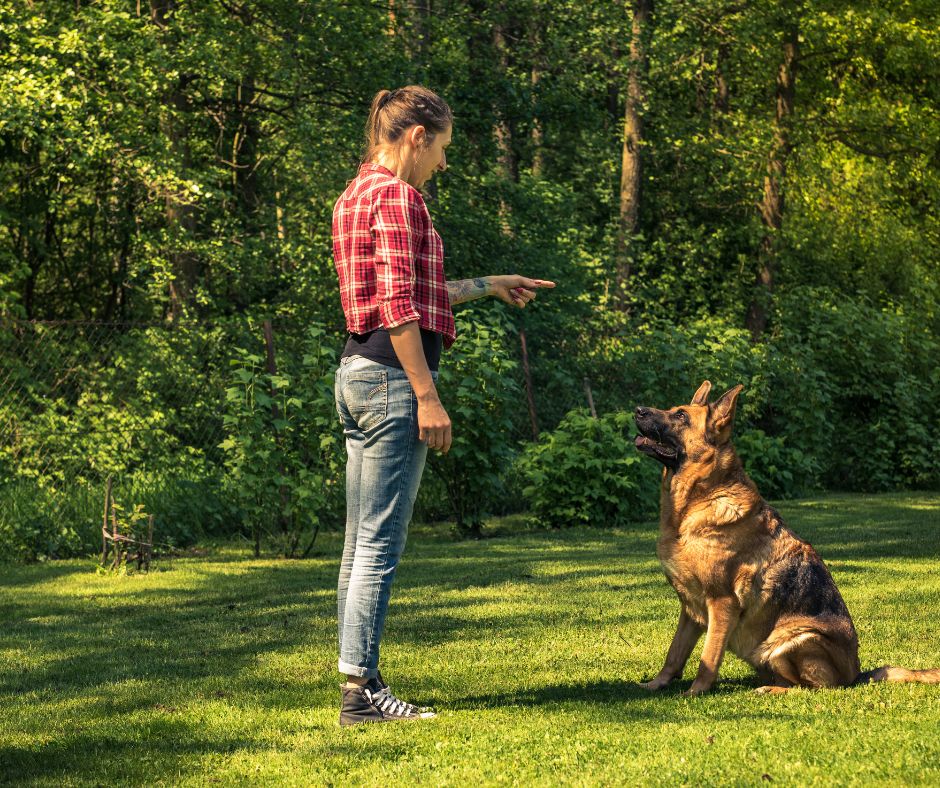
Consistency is the key to maintaining the training progress you’ve achieved with your German Shepherd. Even when they get older, reminding them of the simple commands and using rewards ensures they remember their training.
Set aside regular training sessions to practice commands and introduce new challenges. Consistency in your expectations and rewards will help solidify their understanding of what you want from them.
Stay patient and understanding during training. Like us, dogs can have off days or might not respond as quickly as expected. Consistent and positive training will keep them motivated and eager to learn.
Beyond the Basics: Resources and Professional Guidance for Advancing Training
After you’ve learned the basics, think about trying some special training activities. Also, getting help from experts can unleash their full potential.
Advanced classes, for scent or agility, make them think and move while you work together as a team. Also, getting a professional dog trainer or going to workshops can help with any issues your German Shepherd has. Books and online resources are great too.
Training for Specific Activities: Exploring Specialised Paths with Your German Shepherd
While you learn, you might find things your German Shepherd likes and is good at.
Therapy work can be good if they’re calm and gentle. They can make people happy in hospitals or nursing homes.
You could do fun competitions like obedience or agility trials. Your German Shepherd’s skills can shine in these activities.
They might like search and rescue training. They can use their strong senses to help find missing people.
Remember, not all dogs like everything, so pay attention to what your German Shepherd enjoys and can do.
Keeping Up with Training – Embracing Life Long Learning
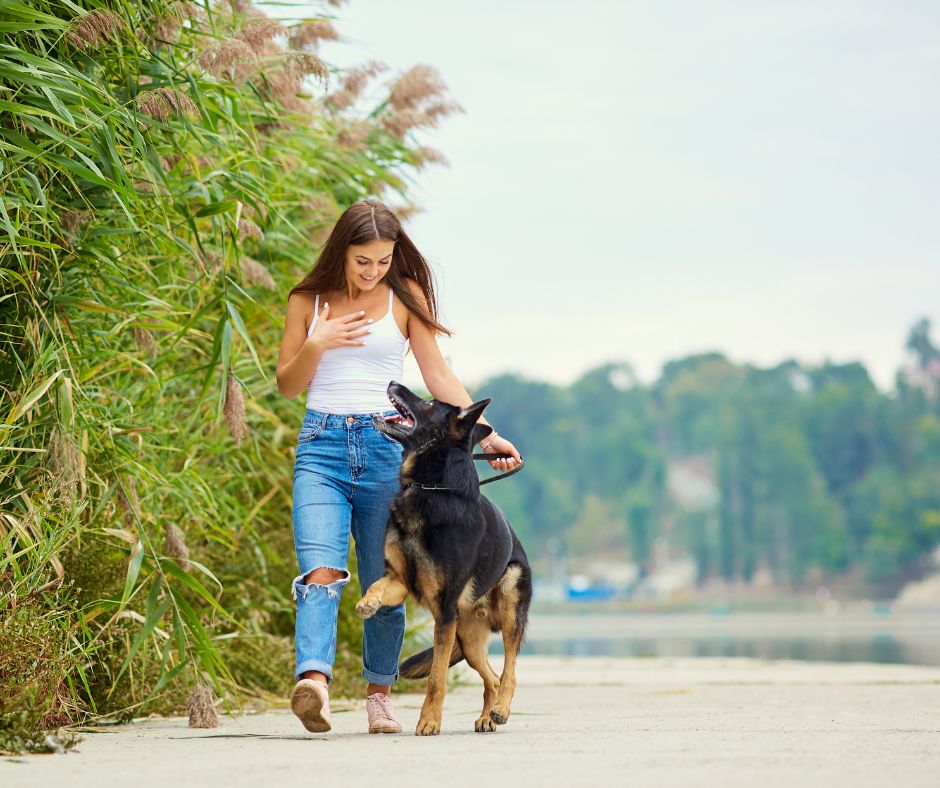
Keep doing training often and stay consistent so your German Shepherd keeps behaving well. As you try new things and get help from experts, their skills will improve, and your bond will strengthen.
Exploring Special Activities
Trying different things that match their skills and interests can be exciting and help them grow. Have fun on this journey with your loyal German Shepherd friend.
Lifelong Learning
Training is always going on. Make sure your German Shepherd keeps learning to stay sharp and happy. Give them new things to do and games that challenge them. This makes them curious and ready to learn.
Fun and Challenges
Doing puzzles, hiding things, and playing together is great for their minds and strengthens our bond.
Rewarding Good Behavior
Keep using rewards to teach them and make them remember their training. This builds trust and a good relationship between you and your German Shepherd.
Be consistent with your rewards, praising and treating them for demonstrating desirable behaviours. This consistency ensures they associate positive experiences with following commands and behaving appropriately.
Adapting to Changing Needs: Tailoring Training to Your German Shepherd’s Life Stages
As your German Shepherd grows older, their needs and abilities may change. Adapting your training approach to suit their life stage is crucial for continued success.
Older German Shepherds might need more breaks and easy exercises. Ensure they’re thinking and doing gentle exercises to keep them happy and moving.
Watch for any signs they might be hurting or not thinking clearly, and change how you teach them if needed. Training should always be a positive and enjoyable experience, regardless of age.
Seeking Professional Support: Consulting Trainers and Behaviourists
As your German Shepherd grows, there might be times when getting help from professionals is a good idea. Trainers and experts in behaviour can give advice and solutions for specific problems.
Professionals can make a big difference if you need help with training or need help with unique things. They can understand what your dog needs and make a plan for them.
If your dog acts aggressively, getting expert help immediately is essential. Aggression can have many reasons behind it, so you must take care of it quickly. Experts can help stop the aggression and keep your dog and others safe.
Professional trainers also know a lot about advanced training and can help you in competitions or particular jobs.
Keep Learning
Help your German Shepherd have a good and full life by keeping them thinking and rewarding their good actions. Change how you train as they get older to match what they need.
Getting Professional Help
Sometimes, you need professionals to help with problems. They know what to do. Also, keep on learning with your loyal German Shepherd. Together, you’ll forge an unbreakable bond built on love, trust, and endless discovery.
The Importance of a Training Routine: Building the Foundation for Success
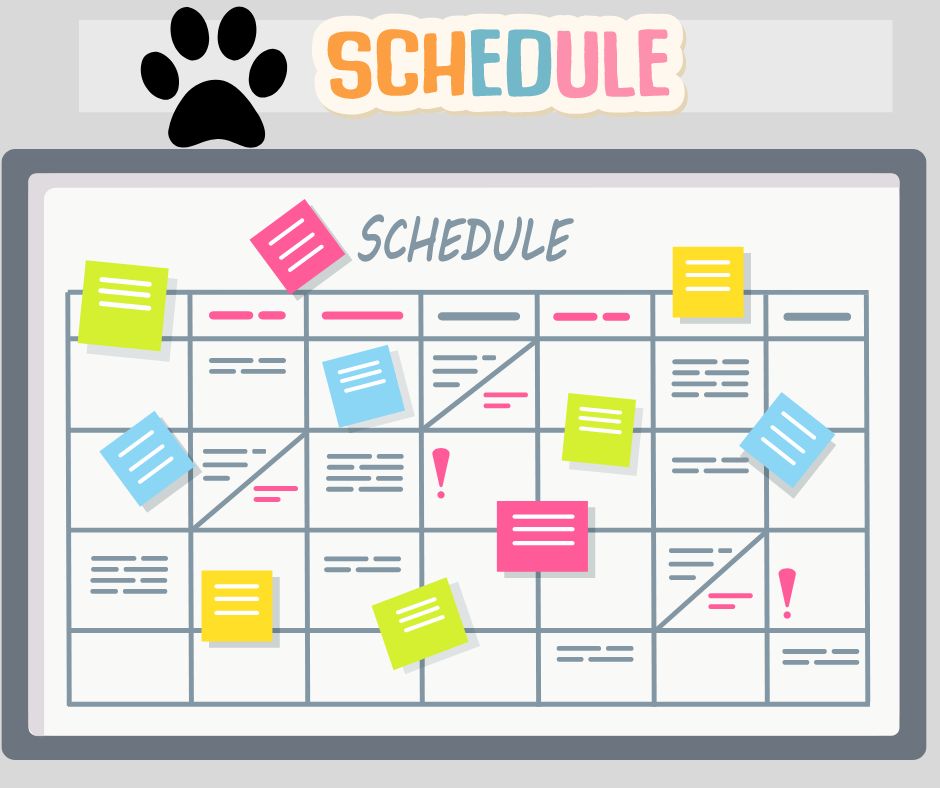
Having a training routine is essential when teaching your German Shepherd. It sets the stage for success and makes your friendship stronger. Doing things the same way all the time and having a plan help training work and is key to a well behaved dog.
Let’s explore why a training routine is essential and how it benefits you and your German Shepherd.
Creating Clear Expectations
A training routine provides clear expectations for your German Shepherd. When they know what to expect, it reduces confusion and anxiety, leading to a more confident and relaxed pet.
Consistent cues and commands help your dog understand what you want from them, making it easier for them to respond appropriately.
Reinforcing Good Behavior
Doing training often helps you make good behaviour stick. When you reward them with treats, praise, or cuddles, they connect doing the right thing with the nice thing they get.
This makes them want to do the good thing again and again, so they’ll do it without thinking about different situations.
Strengthening the Bond
Training times let you and your German Shepherd become closer friends. Doing things together in a fun and pleasant way makes them trust you more and strengthens your bond. Your dog will think of training as happy times with you, and this helps your friendship grow.
Mental Stimulation and Focus
Dogs, especially smart ones like German Shepherds, really like thinking. When you do training often, it keeps their minds working well.
Interesting and fun training stops them from getting bored or doing things they shouldn’t do because they have too much energy.
Progress Tracking and Motivation
When you have a training plan, you can see how your dog is getting better and be happy about what they do.
Writing down all the cool things they learn makes both of you want to keep getting better and doing new things together.
Building a Reliable Response
When you train the same way every time, your German Shepherd learns to listen and do what you say, no matter what.
Whether you’re at home, in the park, or amidst distractions, their learned behaviours remain consistent. This reliability is crucial for ensuring your dog’s safety and the safety of those around them.
Reducing Behavioral Problems
A well-structured training routine can address and prevent common behavioural problems. Having a plan helps you deal with problems step by step and fix them by using rewards. This stops bad things from happening and makes your dog behave better.
Confidence and Independence
When your German Shepherd learns different things, they start feeling sure of themselves and can do things on their own. This confidence goes beyond training times and helps them be good and behave well in different places.
A training routine is a cornerstone of successful German Shepherd training. A training plan helps in many ways: it makes things organised, rewards good actions, makes your bond stronger, and keeps your dog’s mind sharp.
By being consistent, patient, and staying positive, a training routine builds a strong bond with your German Shepherd. Every moment spent together becomes joyful and unforgettable.
Frequently Asked Questions: Unleashing the Secrets of German Shepherd Training

When should I start training my German Shepherd puppy?
The earlier, the better! Start training as soon as you welcome your puppy home. German Shepherds learn a lot during their socialisation phase, usually from 3 to 16 weeks old. Start with basic commands and gentle socialisation to set a solid foundation for a well-behaved companion.
How can I stop my German Shepherd from excessive barking?
Dealing with excessive barking is a common challenge, but you can tackle it with patience and positive reinforcement. Identify the triggers behind the barking and redirect their focus to a positive activity. Reward calm and quiet behaviour, and be consistent in your responses. Over time, they’ll learn appropriate barking habits.
What’s the best way to potty train my German Shepherd puppy?
Potty training requires consistency and establishing a routine. Plan to take your puppy outside often, especially after they eat or rest. When they go potty in the right spot, give them treats and say nice things. Supervise them indoors and be patient through accidents, as accidents are a part of the learning process.
How can I prevent separation anxiety in my German Shepherd?
Gradually acclimate your German Shepherd to staying on its own to prevent separation anxiety. Begin by leaving them for short periods and progressively increasing the duration. Leave them with interactive toys or puzzle feeders to keep them engaged. Always reward calm behaviour when you return, and avoid making a big fuss when leaving.
Can I train my German Shepherd to do advanced tricks like agility or scent detection?
Absolutely! German Shepherds are highly intelligent and excel in advanced training activities. Agility training uses their energy, and scent detection uses their strong sense of smell.
By using rewards and patience, you can unlock their full potential and have fun facing new challenges together.
Is it necessary to use punishment-based training methods?
No, punishment-based training methods are not recommended. Positive reinforcement, using treats, praise, and play, is the most effective and humane way to train German Shepherds. This way of training makes a strong bond and trust and helps them do good things without getting scared or worried.
Can I train my German Shepherd if I’m not a professional trainer?
Absolutely! You don’t need to be a professional trainer to have a well-behaved German Shepherd. Being a good owner, using rewards, and keeping things the same will help you have a dog that loves you and listens well.
How often should I train my German Shepherd?
Consistent training sessions are crucial for reinforcing commands and fostering a strong bond. Short, frequent sessions work best, typically lasting 10-15 minutes, several times daily. Be mindful of your dog’s attention span, and end each session on a positive note.
Can older German Shepherds still learn new tricks?
Absolutely! German Shepherds are lifelong learners. Mental stimulation and training keep their minds sharp and engaged regardless of age. Continue introducing new challenges and tricks to ensure their ongoing growth and fulfilment.
Where can I find professional help for training my German Shepherd?
You can find professional help from certified dog trainers and behaviourists. Find trainers who know about using rewards and have worked with German Shepherds. Many places offer classes and workshops that fit what you want to learn and do.
Get ready for the fun training journey with your German Shepherd! With these common questions answered, you’re prepared to start a happy and rewarding training adventure. Have an excellent time training!
Conclusion: Our Journey to Creating Well-Behaved German Shepherd Companions
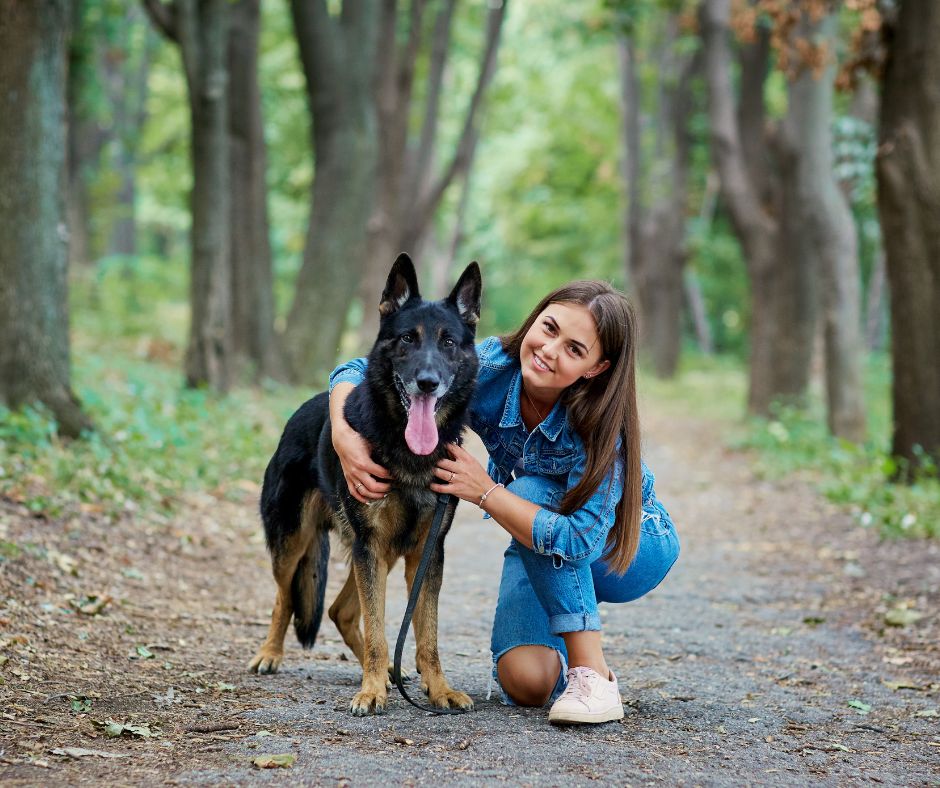
What a fantastic journey we’ve been on together, delving into the world of German Shepherd training! I hope you’ve found this guide as helpful and enjoyable to read as I did writing it.
Let’s take a moment to reflect on the incredible things we’ve learned and how they’ll shape our relationship with our furry companions.
The Importance of Leadership and Trust
Remember when we discussed becoming the pack leader and building trust with our German Shepherds? It’s all about being their reliable and loving guide on this training adventure.
We’ve made a strong bond and had a good time learning with our pups by using rewards and keeping things the same.
Mastering the Basics and Going Beyond
Who could forget the excitement of teaching our German Shepherds essential commands like sit, stay, and come? But we didn’t stop there; we took things to the next level with agility training and scent detection. Seeing our dogs excel and grow in confidence has been truly rewarding.
Navigating Common Behavior Challenges
Ah, those pesky behaviour challenges! Excessive barking and separation anxiety have been hurdles, but we faced them head-on with patience and love.
We used friendly training methods to overcome these problems and make our home calm and happy.
Equipping Ourselves with the Right Tools
We’ve been through the process of choosing the perfect collar, leash, clicker, and treat pouch to aid us in our training endeavours.
It’s incredible how these simple tools have enhanced our communication and brought joy to our training sessions.
From Puppies to Adulthood: Training Tips for All Life Stages
Our German Shepherds have grown with us, from adorable puppies to mature adults. Adjusting our training methods along the way has ensured their progress and kept them engaged.
The moments we’ve shared during this journey have forged an unbreakable bond between us.
Lifelong Learning and Growing Together
This guide has taught us that training is a lifelong adventure.
Our German Shepherds will keep doing well as we give them interesting things to do every day. Change how we teach them when they need it, and do new things together to keep it varied.
As we finish this guide, let’s remember the times we’ve had with our loyal friends. Whether it’s a calm training time in the park or a fun agility course, these moments make great memories.
So, let’s keep going with what we know, staying patient and full of love. Training our German Shepherds is a fantastic journey we do together. We’ll keep growing and having fun times that we’ll never forget.
Thanks for coming along on this training trip. I hope you and your German Shepherds have a life full of love, happiness, and unforgettable moments.
Please comment below if you have any questions or want to share your experiences with these fabulous dogs.
